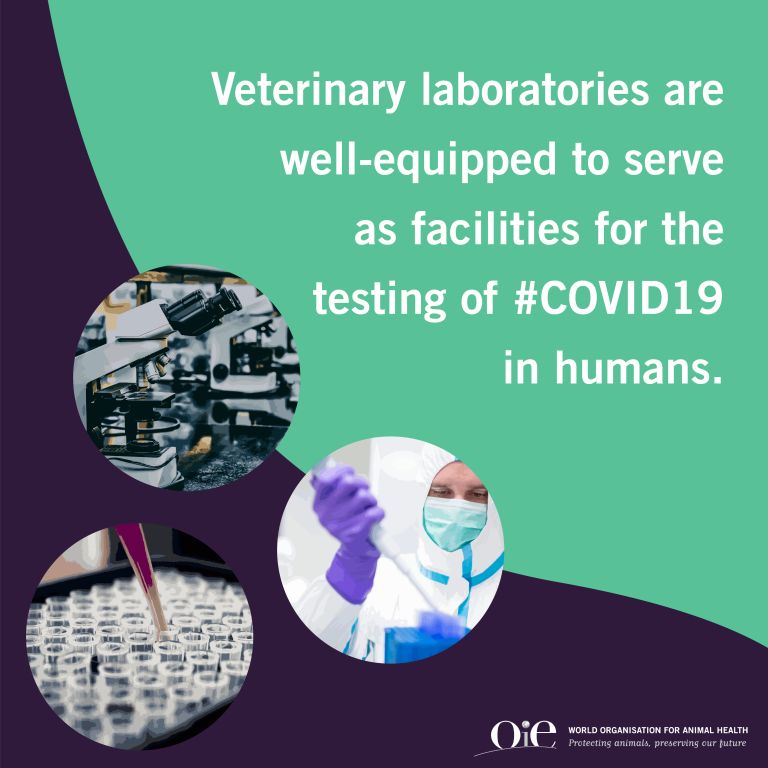



The COVID-19 pandemic has been putting tremendous pressure on the public health system worldwide. Globally, as of 27 August 2020, there have been 24,021,218 confirmed cases of COVID-19 reported to WHO. Diagnostic testing is critical to identify people infected with SARS-CoV-2 and control of the virus infection in humans. And here the veterinary services have certain capabilities to assist public health authorities with laboratory testing of samples for SARS-CoV-2, using the capacity of veterinary diagnostic laboratories.
In response to the COVID-19 pandemic, the OIE expert group promptly developed high-level guidelines for testing human specimens for SARS-CoV-2 in veterinary laboratories to support public health authorities in meeting the emergency demand for testing, which is a critical aspect in responding measures for the pandemic in many countries. Most veterinary diagnostic laboratories are experienced in handling bulk samples in a highly demanding research environment.
The OIE Sub-Regional Representation for Central Asia encourages the countries of the region to actively apply the principles of the “One Health” approach and provided support to ensure better communication and coordination for multilateral and multisectoral activities in the region.
The OIE SRR for Central Asia is providing advisory support to the veterinary services to assist the human health authorities in testing COVID-19 in their veterinary laboratories. According to the OIE Delegates, the veterinary laboratories in Kazakhstan, Kyrgyzstan, and Uzbekistan are actively involved in the process of testing human specimens for COVID-19, considering risk assessment, biosafety, and priority.
Kazakhstan
To expand the capacity of PCR testing, the Ministry of Health has been granted access to specialized premises in 24 district veterinary modular laboratories located in 11 regions of the country from August 1, 2020. All transferred premises are located on the second floor of the laboratories and meet the requirements for working with groups II-IV of pathogenicity of microorganisms: they have separate entrances, sanitary gates, and biological safety boxes. This will allow veterinary laboratories to continue working on the main profile of their activities on the first floor.
In addition, a mobile veterinary laboratory is used to conduct diagnostic studies in remote rural areas. Furthermore, 26 sets of PCR equipment were handed over to public health authorities. 67 specialists of the Republican Veterinary Laboratory and the National Agrarian Science and Educational Centre, who have experience and skills in diagnosing especially dangerous infections common to humans and animals, are involved in the fight against COVID-19. Moreover, National Reference Center for Veterinary sent 10 specialists with 6 PCR equipment to 5 regions of the country.
Kyrgyzstan
The National Veterinary Service is playing an active role in the public health response by providing reagents and PCR kits for two veterinary diagnostic and expertise centres in the northern and southern regions. Furthermore, they are providing qualified laboratory specialists to handle samples, test and report the results of COVID-19 samples, using an adequate level of biosecurity and biosafety. These laboratories meet the requirements and national regulatory and emergency response standards and OIE guidelines.
In addition, laboratory PCR equipment was transferred to the Ministry of Health of the Kyrgyz Republic to provide practical assistance in the fight against COVID-19, and 7 virologists were seconded.
Uzbekistan
The National Veterinary Service, following the OIE guideline for testing human specimens for SARS-CoV-2 in veterinary laboratories, has reported on the involvement of 6 regional veterinary laboratories and 26 veterinary laboratory specialists in the fight against the COVID-19 pandemic.
As part of the multisectoral support, PCR diagnostic equipment was transferred to the public health authorities, and PCR specialists were relocated to medical laboratories. According to the National Veterinary Service, samples subject to veterinary control and surveillance by PCR, are temporarily being sent to three regional veterinary laboratories; thereby they are ensuring a smooth operation in animal health and welfare and veterinary health.
The current emergency has clearly demonstrated the relevance and importance of intersectoral cooperation. Within the “One Health” concept, the OIE, together with WHO, calls for the strengthening of a sustainable multisectoral response to food safety, zoonotic, and other public health threats at the interface between human and animal ecosystems. It is important to harmonise and strengthen mechanisms for the exchange of epidemiological and laboratory data between sectors.






